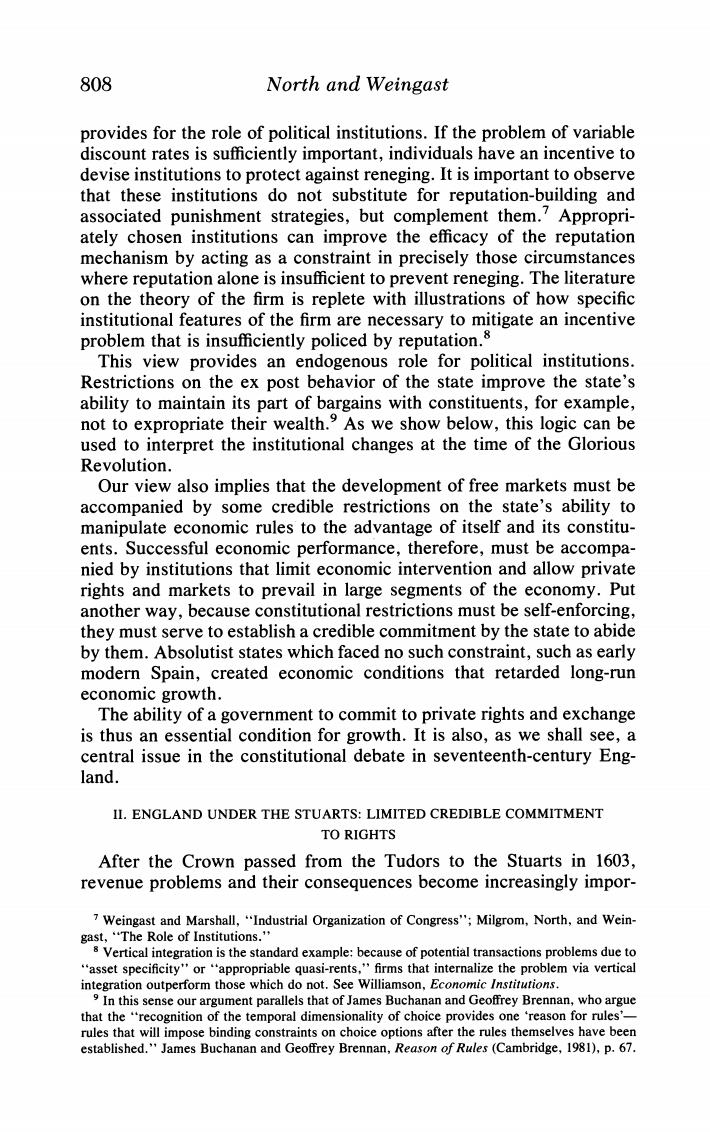正在加载图片...

808 North and Weingast provides for the role of political institutions.If the problem of variable discount rates is sufficiently important,individuals have an incentive to devise institutions to protect against reneging.It is important to observe that these institutions do not substitute for reputation-building and associated punishment strategies,but complement them.?Appropri- ately chosen institutions can improve the efficacy of the reputation mechanism by acting as a constraint in precisely those circumstances where reputation alone is insufficient to prevent reneging.The literature on the theory of the firm is replete with illustrations of how specific institutional features of the firm are necessary to mitigate an incentive problem that is insufficiently policed by reputation.8 This view provides an endogenous role for political institutions. Restrictions on the ex post behavior of the state improve the state's ability to maintain its part of bargains with constituents,for example, not to expropriate their wealth.As we show below,this logic can be used to interpret the institutional changes at the time of the Glorious Revolution. Our view also implies that the development of free markets must be accompanied by some credible restrictions on the state's ability to manipulate economic rules to the advantage of itself and its constitu- ents.Successful economic performance,therefore,must be accompa- nied by institutions that limit economic intervention and allow private rights and markets to prevail in large segments of the economy.Put another way,because constitutional restrictions must be self-enforcing, they must serve to establish a credible commitment by the state to abide by them.Absolutist states which faced no such constraint,such as early modern Spain,created economic conditions that retarded long-run economic growth. The ability of a government to commit to private rights and exchange is thus an essential condition for growth.It is also,as we shall see,a central issue in the constitutional debate in seventeenth-century Eng- land. II.ENGLAND UNDER THE STUARTS:LIMITED CREDIBLE COMMITMENT TO RIGHTS After the Crown passed from the Tudors to the Stuarts in 1603, revenue problems and their consequences become increasingly impor- 7 Weingast and Marshall,"Industrial Organization of Congress";Milgrom,North,and Wein- gast,"The Role of Institutions." 8 Vertical integration is the standard example:because of potential transactions problems due to "asset specificity"or"appropriable quasi-rents,"firms that internalize the problem via vertical integration outperform those which do not.See Williamson,Economic Institutions. 9 In this sense our argument parallels that of James Buchanan and Geoffrey Brennan,who argue that the "recognition of the temporal dimensionality of choice provides one 'reason for rules'- rules that will impose binding constraints on choice options after the rules themselves have been established."James Buchanan and Geoffrey Brennan,Reason of Rules(Cambridge,1981),p.67.808 North and Weingast provides for the role of political institutions. If the problem of variable discount rates is sufficiently important, individuals have an incentive to devise institutions to protect against reneging. It is important to observe that these institutions do not substitute for reputation-building and associated punishment strategies, but complement them.7 Appropriately chosen institutions can improve the efficacy of the reputation mechanism by acting as a constraint in precisely those circumstances where reputation alone is insufficient to prevent reneging. The literature on the theory of the firm is replete with illustrations of how specific institutional features of the firm are necessary to mitigate an incentive problem that is insufficiently policed by reputation.* This view provides an endogenous role for political institutions. Restrictions on the ex post behavior of the state improve the state's ability to maintain its part of bargains with constituents, for example, not to expropriate their ~ealth.~ As we show below, this logic can be used to interpret the institutional changes at the time of the Glorious Revolution. Our view also implies that the development of free markets must be accompanied by some credible restrictions on the state's ability to manipulate economic rules to the advantage of itself and its constituents. Successful economic performance, therefore, must be accompanied by institutions that limit economic intervention and allow private rights and markets to prevail in large segments of the economy. Put another way, because constitutional restrictions must be self-enforcing, they must serve to establish a credible commitment by the state to abide by them. Absolutist states which faced no such constraint, such as early modern Spain, created economic conditions that retarded long-run economic growth. The ability of a government to commit to private rights and exchange is thus an essential condition for growth. It is also, as we shall see, a central issue in the constitutional debate in seventeenth-century England. 11. ENGLAND UNDER THE STUARTS: LIMITED CREDIBLE COMMITMENT TO RIGHTS After the Crown passed from the Tudors to the Stuarts in 1603, revenue problems and their consequences become increasingly impor- 'Weingast and Marshall, "Industrial Organization of Congress"; Milgrom, North, and Weingast, "The Role of Institutions." Vertical integration is the standard example: because of potential transactions problems due to "asset specificity" or "appropriable quasi-rents," firms that internalize the problem via vertical integration outperform those which do not. See Williamson, Economic Institutions. In this sense our argument parallels that of James Buchanan and Geoffrey Brennan, who argue that the "recognition of the temporal dimensionality of choice provides one 'reason for rules'- rules that will impose binding constraints on choice options after the rules themselves have been established." James Buchanan and Geoffrey Brennan, Reason of Rules (Cambridge, 1981), p. 67